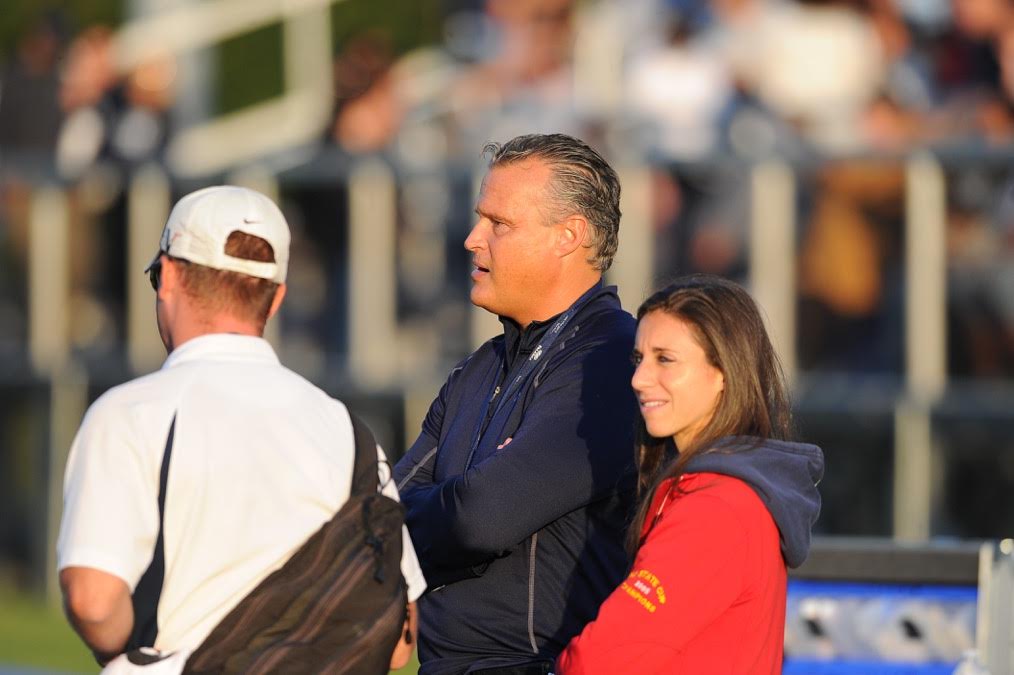DR. DWYER IS LEADING BY EXAMPLE IN SOUTH JERSEY – PART ll
Al Thompson
 Dr. Dwyer (middle) and his staff can be seen on the sidelines of many scholastic and college athletic events throughout South Jersey every year. Photo by Andy Lewis / contrastphotography.com
Dr. Dwyer (middle) and his staff can be seen on the sidelines of many scholastic and college athletic events throughout South Jersey every year. Photo by Andy Lewis / contrastphotography.comDr. Thomas Dwyer, M.D., FAAOS, Orthopedic Surgeon, is a specialist in Orthopedic and Sports Medicine and has dedicated himself to working with athletes and active people of all backgrounds, ages and gender.
This is part II of a two-part interview with the South Jersey President/CEO of Premier Orthopaedic Associates.
In Part one, we introduced you to Dr. Dwyer and his staff at Premier Orthopeadic Associates, we went over their mission statement and some of the new ways Dr. Dwyer and his staff are treating the community from high school and college athletes to the adult workforce as well as recreational competitors.
In Part II we talked to Dr. Dwyer about the future of Orthopedics and sports medicine five years down the road.
STEM CELL THERAPY
According to Wikipedia, Stem cell therapy is the use of stem cells to treat or prevent a disease or condition.
Bone marrow transplant is the most widely used stem cell therapy, but some therapies derived from umbilical cord blood are also in use. Research is underway to develop various sources for stem cells, and to apply stem cell treatments for neurodegenerative diseases and conditions, diabetes, heart disease, and other conditions including paralysis.
Dr. Dwyer says stem cell therapy will change the quality of our health significantly, across the board, if it is allowed in this country.
“If I were to look into my crystal ball and you were to ask me about new ways to treat people five years from now, it will clearly be stem cell therapy,” Dr. Dwyer said. “It’s really where this is headed. I think the prior administrations here in this country, for whatever reason, put the kibosh on stem cells particularly the Bush era, mainly I think, from a religious background and maybe some misinformation.
“Other countries around the world, particularly Japan and China continue to work on stem cell research and the United States is behind in that regards,” he continued. “Most of the big (pharmaceutical) companies that are based here in the United States have stem cell factories in other countries, for instance South America and Mexico.”
Dr. Dwyer went as far as to say stem cell therapy could literally change the entire medical world for the better.
“Stem cell therapy, whether it be adult, embryonic fetal, stem cells probably are going to be the savior of orthopedic surgery as far as taking us to the next step where we can now really change the lives of people,” Dr. Dwyer said. “At this point in the United States, if it’s becoming accepted with regulation, I think that stem cell is going to be a dramatic part of our arsenal going forward.”
CONCUSSIONS AND HEAD INJURIES
Dr. Dwyer was asked what is the biggest challenge for making football and other contact sports safer?
“I think it has to be concussions and head injuries,” Dr. Dwyer said without hesitation. “I think contact sports in general (have that challenge). You see articles every day now, for instance, head gear for lacrosse players … female gear versus male gear for example and the differences there.
“I don’t think there is any question in the NFL right now that their focus is on limiting head injury and concussion management, probably spawned by the plethora of litigation against them.”
Dr. Dwyer said peer pressure and pressure from coaches aim at a competitor to return to a game right after a head injury without proper medical scrutiny is decreasing and is a step in the right direction.
“I think in the past, contact sport meant that, with that whole genre of being a tough, powerful guy … get back in the game and keep going,” Dr. Dwyer said. “As the public now has gotten behind it, we’re seeing what these repetitive concussions can do to people when they get older.
“Any of us who have played sports, we’ve all had concussions. I think it’s the rare athlete that goes through a season without a concussion. Back then we didn’t know what a concussion was. It was like ‘how many fingers am I hold up? True or false? And you’re back in.’ But now you can see we have very specific guidelines, not only for grading concussions but for returning to play considerations. I think that is a good thing. Head injuries are serious. And I think we’re starting to put together the timeline with small but repetitive head injuries and what they can do down the road.”
Dr. Dwyer said after all the research that is out there with regards to head injuries and the amount of time he spends on high school and college sidelines observing head injuries, he felt it necessary to hire “A Fellowship-trained, family-practice sports medicine specialist who had helped develop some of the guidelines for concussion,” Dr. Dwyer said. “Because the education and the rate of education was progressing so rapidly that I needed someone who was going to stay on top of that 100 percent or 110 percent.”
PERFORMANCE ENHANCING DRUGS
Most in the medical community agree that steroids and other PEDs are a significant factor with regards to the rise in the intensity and severity of sport injuries including head injuries in all contact sports.
Prolonged steroid use can cause kidney impairment or failure; damage to the liver; and cardiovascular problems including enlargement of the heart, high blood pressure, and changes in blood cholesterol leading to an increased risk of stroke and heart attack (even in young people).
Dr. Dwyer says that although he has not encountered any evidence of steroid use among high school athletes, he recognizes that use of PEDs among college and pro athletes as well recreational competitors, especially strength athletes, is out of control.
“It is a crisis,” Dr. Dwyer said. “I see steroid use among many men in their 40s who have not let go of the fact they are aging.”
Powerlifting and strongman competitions all over the country are populated with the exact male competitors Dr. Dwyer described. He admits though that education at the high school level is key to curbing steroid use in this this country. Dr. Dwyer says larger corporations and businesses in the fitness industry need to get involved with the education process at the neighborhood level.
“Local gyms should start educating their members,” Dr. Dwyer said. “The national fitness center chains should take ownership of making the public aware of the long term health effects of steroid use. Posters with information about PEDs should be at drinking fountains in every gym. I think that would help a lot.”
Premier Orthopaedic Associates has four locations throughout South Jersey including Vineland, Mullica Hill, Gloucester and Elmer. Call Call 856-690-1616 for more information.
-
Veronica Rizzo-George












